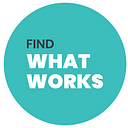The need for Experimentation Works
The official launch of Experimentation Works (EW), on April 6, 2018, was a great achievement, marking the culmination of the communities’ extensive efforts and goodwill. It was great to see so many passionate individuals who not only wanted to experiment but who also wanted to do so in the open. It was also exciting looking around the room at all the faces and realizing how quickly our cohort had grown (we are now 8 departments strong). Realizing how far we had come, it made me reflect on our humble beginnings.
In summer of 2017, new to the position of Assistant Secretary, Policy and Priorities, the Experimentation and Innovation team at Treasury Board Secretariat (TBS) approached me to discuss their work supporting the President’s mandate commitment and the Experimentation Direction for Deputy Heads. We discussed the types of tools and resources we could develop to help build the capacity for experimentation across the federal government. I imagine it was not the easiest meeting for them as at times I conflated terms and issues (innovation vs. experimentation) and kept asking about whether there were concrete examples of experimentation we could follow across government. Even though we knew departments were experimenting, concrete examples were hard to find. Why was this?
There may have been several reasons why it was hard to find examples, but three that resonated with me were:
· First, language can be a barrier to understanding. Translating what may appear to be a very technical or specialized language into a case study that is simple enough for anyone to understand is not easy. Interpreting without diluting the evidence is a unique skill-set, and that knowledge-brokering ability needs to become more pervasive.
· Second, there is a misconception that sharing widely, or for different audiences, may simply create more work with the same outcome. There is no guarantee that sharing information will be perceived more positively. With this in mind, some people might think it’s better to fly under the radar to avoid attention, whether it is positive or negative.
· Third, we oftentimes find ourselves immersed in our work, so much so that we never take the time to communicate with each other about what we’re working on.
Recognizing that something needed to change, the team approached me with a pitch for EW. The concept was elegant in its simplicity: help build capacity by doing, with others. Experimenting as a cohort and documenting it in the open means anyone inside or outside of the government can follow along and get access to ”real time” case studies.
As a result, one of the guiding principles of EW is to break the cycle of not communicating about experimentation. To do this, our goal is to get the community to proactively communicate about the work they are doing so that everyone can follow-along as it is being done. Additionally, our goal is to create a community that experiments in different areas, with the intention of sharing experiences and knowledge that can influence other experimentation in the community. With an established community of experimenters, our hope is that we can create a culture of open communication, enabling us to harness the wisdom of our colleagues to improve our work.
I don’t want to get ahead of myself, EW is just at the beginning of its journey and we’re excited about what opportunities lie ahead. Right now we have several teams, from four government departments, matched with experts from other departments to work on experiments. Despite our modest size, I believe our work can have an important impact on the community. The Experimentation and Innovation team is helping connect and guide teams with their approach to experimentation as well as document the experiences along the way.
As public servants we serve Canadians, what we do matters and so it should be based on an understanding of what works and what does not. Experimenting, the rigorous testing of ideas to see if they work better than other ideas, is one tool at our disposal that can be used to generate better evidence while at the same time being proactive about sharing what we are doing.
Post by Samantha Tattersall, TBS Champion, EW
Article également disponible en français ici: https://medium.com/@exp_oeuvre
